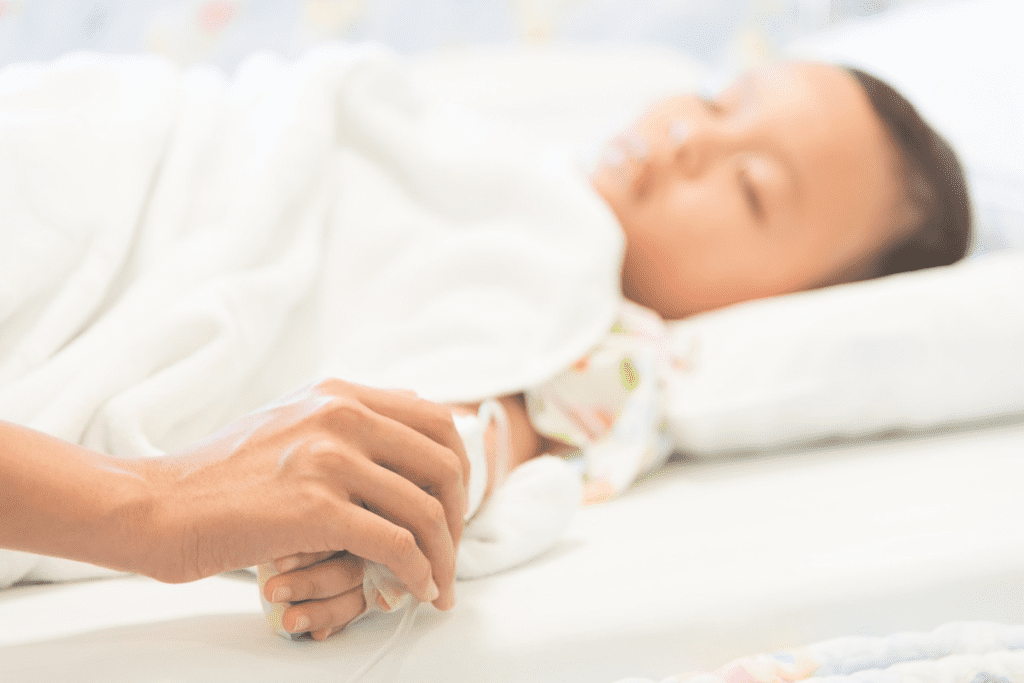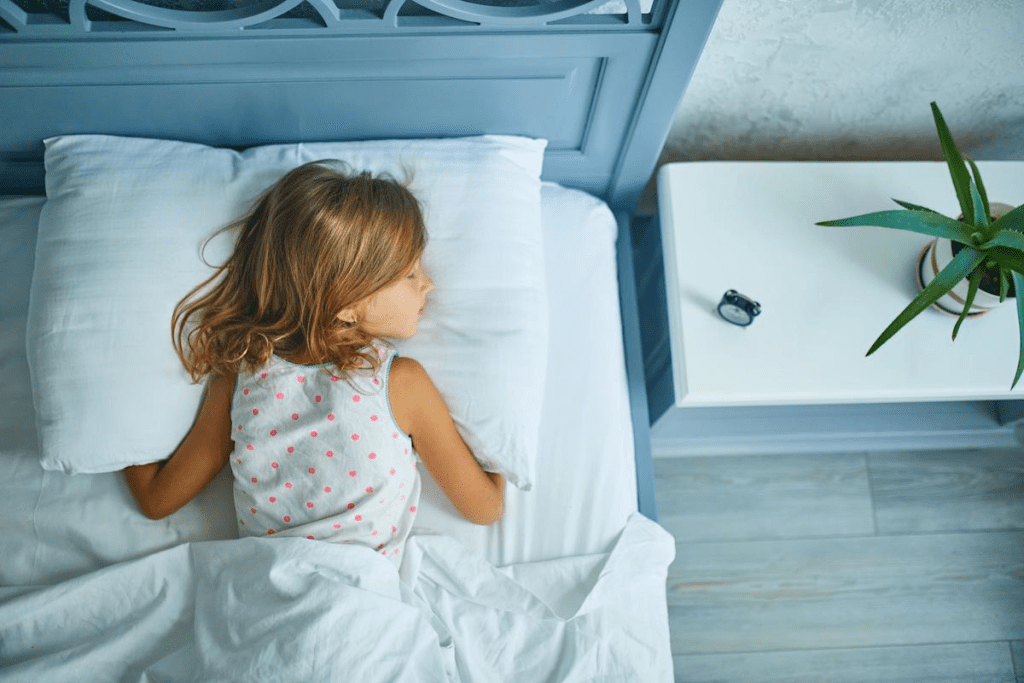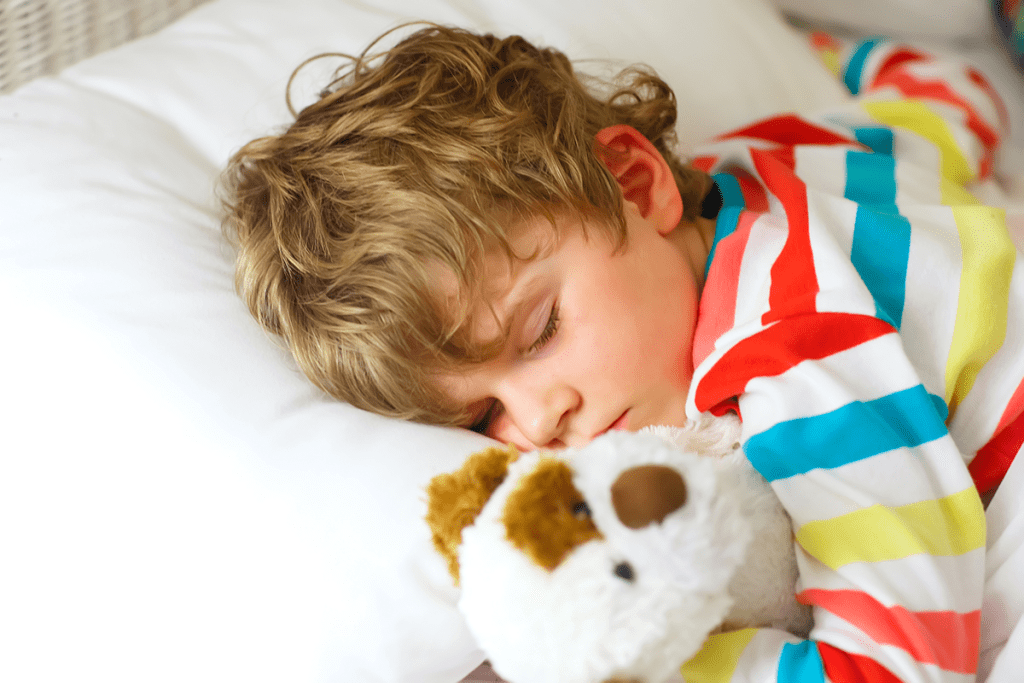Last Updated on October 21, 2025 by mcelik
Pediatric sleep disorders are a big worry for many kids. They can make it hard for children to fall asleep or stay asleep. This can lead to other sleep problems.

Children and teens need at least 9 hours of sleep each night. If they don’t get enough, it can hurt their schoolwork and social life. It’s important to know the signs early so we can help them.
Pediatric sleep disorders are a big problem for kids. They can really hurt a child’s life. It’s important to catch these issues early.
Research shows that up to 30% of kids have sleep issues. About 4% have a sleep disorder. Sleep problems in children are more common than many parents realize. They can affect a child’s health and growth.
Bedtime resistance, waking up a lot at night, snoring, and grinding teeth are common sleep issues. Bedtime resistance hits about 32.4% of kids. Over 26% wake up a lot at night. Snoring affects 14“44.1% of kids, and grinding teeth impacts around 11.8%. Recognizing these issues is the first step towards addressing them.

Spotting sleep disorders early helps a lot. It lets parents and doctors start helping kids right away. This can greatly improve a child’s sleep and health. Early intervention can make a substantial difference in a child’s life. It can help with sleep and overall growth.
It’s important to know the nighttime symptoms of sleep disorders in kids. These issues can really affect a child’s life. Spotting these signs early is key to helping them.

Bedtime resistance is a big problem, hitting about 32.4% of kids. It shows up as not wanting to go to bed, crying, or getting up again. Having a regular bedtime routine can really help.
Over 26% of kids wake up a lot at night. This can upset both the child and their parents. Making the bedroom a sleep-friendly space can cut down on these wake-ups.
Snoring and breathing problems during sleep are big worries, affecting 14% to 44.1% of kids. Snoring is often a sign of sleep apnea, but not all snorers have it. Watching for snoring and pauses in breathing is important for spotting sleep apnea.
Teeth grinding or bruxism is a problem for about 11.8% of kids. It can cause dental issues and jaw pain. Wearing a mouthguard can protect teeth from grinding damage.
These nighttime symptoms can also affect kids during the day. Morning tiredness hits about 41% of kids with sleep issues, and 15-20% feel too sleepy during the day. Fixing these nighttime problems is key to better sleep and less daytime tiredness.
Unusual nighttime behaviors in children might show sleep disorders. These behaviors can really affect a child’s life and growth.
Night terrors and nightmares are scary for kids and parents. Nightmares happen when a child is in the REM sleep stage. Night terrors occur in deep sleep, or the non-REM stage.
Research shows that up to 50% of kids have parasomnias like sleepwalking and nightmares. “Night terrors show the brain’s trouble switching sleep stages,” says a sleep disorder expert. Knowing the difference between night terrors and nightmares is key to the right care.
Sleepwalking, or somnambulism, is a parasomnia that worries parents. It happens when a child walks around during deep sleep. Sleepwalking can be simple or complex, like cooking or leaving the house.
Keeping the sleep area safe is important to avoid accidents during these episodes.
Bedwetting, or nocturnal enuresis, is common in kids. It’s not about being lazy or not trying hard enough. Bedwetting can signal sleep disorders or other health issues.
Fixing bedwetting needs a full plan. This includes behavior changes and, if needed, medical help.
Some kids wake up confused or disoriented. This can mean a sleep disorder. They might not know where they are or get upset easily.
“Waking up confused is linked to sleep inertia, often from disrupted sleep,” says a healthcare expert. Spotting these signs early helps in giving the right support.
In summary, odd nighttime behaviors in kids might point to sleep problems. By tackling these issues, parents and caregivers are key to their kids’ health and growth.
Pediatric sleep disorders can really affect a child’s daily life. They show up in different ways during the day. These symptoms can hurt a child’s life, school work, and how they interact with others.
About 41% of kids with sleep disorders feel tired in the morning. They might find it hard to wake up or have no energy for the day. Morning fatigue makes it tough for kids to focus and do well in school.
15-20% of kids with sleep disorders are always sleepy during the day. They might fall asleep when they shouldn’t. It’s important to tell if they’re just tired or if it’s a sign of a bigger problem. Excessive daytime sleepiness could mean they need help from a doctor.
Children with sleep disorders might get moody or easily upset. They might get frustrated quickly. These mood swings can be hard for kids and their families, affecting their relationships and happiness.
Kids with sleep disorders might have trouble concentrating or learning. They might not do well in school. It’s key for parents and teachers to notice these signs. They could mean the child has a sleep disorder.
Understanding the daytime symptoms of pediatric sleep disorders is very important. It shows we need to take care of the whole child, not just their sleep. By tackling these symptoms, we can help kids with sleep disorders more effectively.
Sleep disorders in children can affect their development and family life. These disorders can show up in many ways. They can impact a child’s life and the lives of those around them.
Children with sleep disorders often have behavioral problems, like hyperactivity. Untreated sleep issues can lead to increased impulsivity and ADHD-like symptoms. It’s important to address these issues quickly.
Sleep disorders can make it hard for a child to learn and focus. Studies show that children with sleep disorders do poorly in school and have trouble concentrating. For example, untreated obstructive sleep apnea (OSA) can cause neurobehavioral problems and decreased attention span.
Sleep disorders can also affect family dynamics and routines. Families may need to change their daily schedules to help the child. Creating a consistent sleep routine and a sleep-friendly environment is key.
If not treated, sleep disorders can cause long-term health and developmental problems. These include behavioral, academic, and even cardiovascular issues. Early treatment of sleep disorders is vital to prevent these risks and ensure the child’s well-being.
In conclusion, sleep disorders can deeply affect a child’s development and family life. Understanding these effects and taking action to address sleep issues is important. This way, we can provide care that supports the health and well-being of the child and the family.
It’s important to know when to get help for sleep issues in kids. We talked about signs like bedtime struggles, waking up a lot, snoring, and feeling very tired during the day. These could mean a child has a sleep disorder.
If a child might have obstructive sleep apnea (OSA), they need a special test. Doctors will help by giving reassurance and finding ways to help them sleep better. As parents, knowing when to get help is key to making sure kids sleep well.
If sleep problems don’t go away, it’s time to see a specialist. We need to act fast to avoid health and learning problems later. By watching for signs and getting help when needed, we help our kids stay healthy and happy.
Symptoms include trouble falling asleep and waking up a lot. Kids might also resist bedtime or snore. Other signs are grinding teeth at night, night terrors, and nightmares.
They might also sleepwalk or wet the bed. Daytime signs are feeling tired in the morning, being too sleepy, and mood swings. They might also have trouble focusing.
Up to 30% of kids have sleep problems. This makes sleep disorders a big worry for parents.
Bedtime resistance means kids don’t want to go to bed. It happens in about 32.4% of children. It could mean there’s a sleep issue.
Sleep disorders can cause bad behavior and learning problems. They can also change how families work together. These issues can affect a child’s health and growth for a long time.
Sleep disorders can mess up family routines. They can cause stress and lower the quality of life for everyone.
If your child keeps waking up at night or has trouble sleeping, see a doctor. Also, if they have unusual behaviors at night, get help.
Kids might wake up a lot, sleepwalk, have night terrors, or snore. These problems can hurt their sleep and health.
Yes, sleep disorders can be treated. Doctors can help with diagnosis and treatment. Plans might include changing behavior, lifestyle, or sometimes medicine.
Help your child by setting a regular sleep schedule. Make their bedroom good for sleep. Avoid exciting activities before bed.Working with a doctor is also key to creating a good care plan.
Subscribe to our e-newsletter to stay informed about the latest innovations in the world of health and exclusive offers!